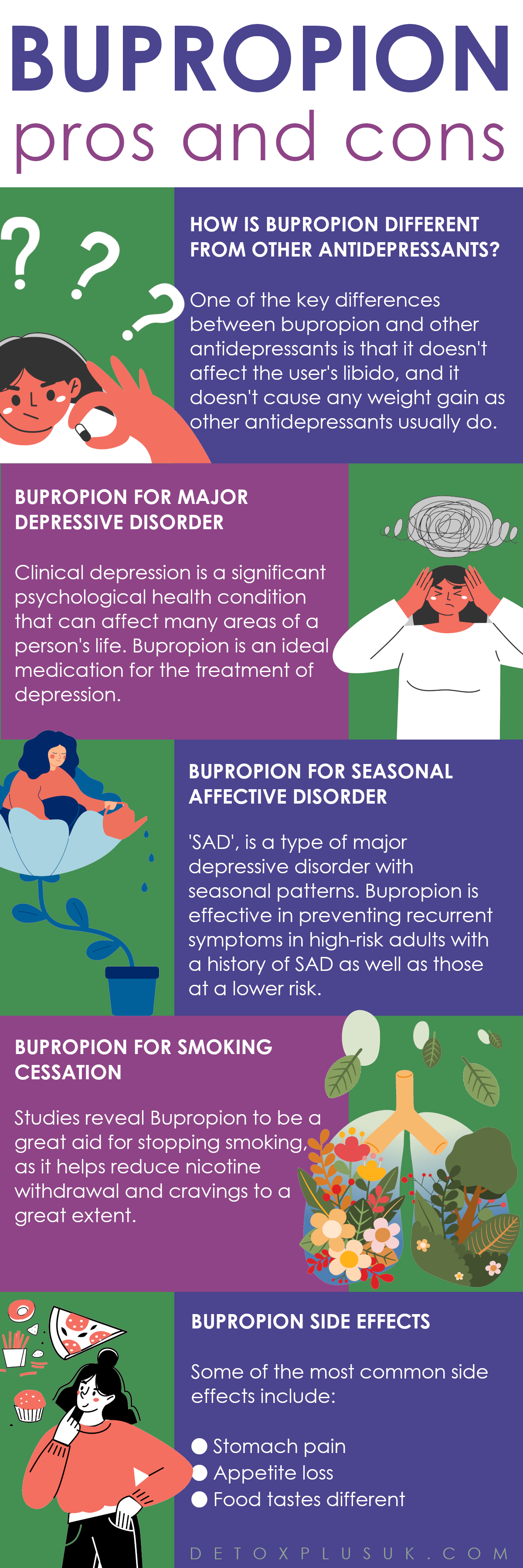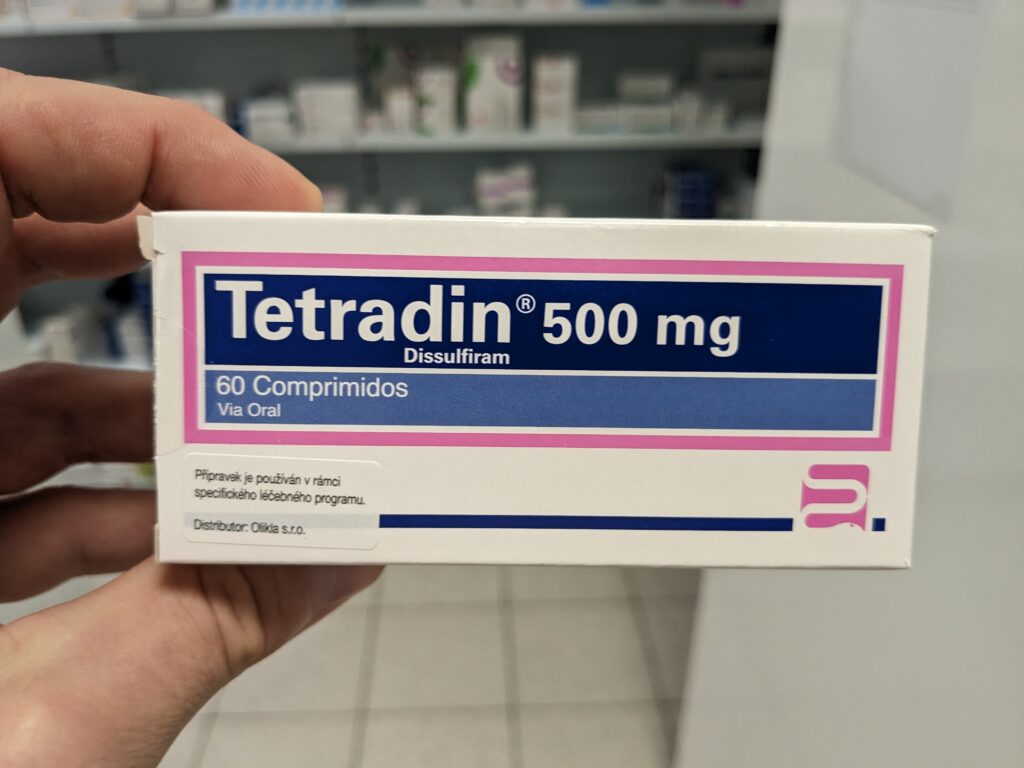Bupropion is taken to aid smoking cessation in combination with motivational support in nicotine-dependent patients.
It has been marketed under the trade name Zyban.
Trials have shown that Zyban effectively reduces nicotine withdrawal symptoms and nicotine cravings, increasing the chances of a person’s success in quitting smoking.
Uses of Bupropion
Bupropion is an antidepressant approved by the US Food and Drug Administration (FDA) in 1989 to treat major depressive disorders. It also has several off-label uses and has since been approved to treat other conditions.
In 1997, it was approved by the FDA to treat smoking addiction and released under the brand name Zyban.
It has proven an effective antidepressant for many depressive conditions, including bipolar disorder. It has also been shown to treat anxiety-related disorders, such as generalised anxiety disorder and PTSD.
Treating mental health illnesses is most effective with behavioural therapies and counselling.

Bupropion comes in tablet form in sustained-release (SR) and extended-release (XL). It also comes in various dosages.
It can be used for the treatment of SAD (seasonal affective disorder), MDD (major depressive disorder), as a smoking cessation medication, ADHD (attention deficit hyperactivity disorder), and to treat neuropathic pain.
Bupropion is not an SSRI but has proven effective in treating depressive disorders that do not respond to SSRIs, including sertraline and Prozac.
It has also effectively combat undesirable consequences commonly associated with SSRI medications, such as lethargy, drowsiness, weight gain and sexual dysfunction.
Bupropion is sold under various brand names, including:
- Wellbutrin
- Zyban
- Budeprion SR
- Aplenzin
- Buproban
- Forfivo XL
- Elontri
What Bupropion is used to treat
It has many uses for its dual action of inhibiting the reuptake of dopamine and norepinephrine. It has both licensed indications and off-label indications.
It can be used to treat:
- Moderate to severe depression
- Anxiety disorders
- Dopamine deficiency syndrome
- Seasonal affective disorder (SAD)
- Post-traumatic stress disorder (PTSD)
- ADD & Attention Deficit Disorder & attention deficit hyperactivity disorder)
- Sexual dysfunction caused by other antidepressant medications
- Neuropathic pain
- Smoking addiction
Bupropion Vs SSRI
SSRIs’ main benefits are that they do not cause sexual dysfunction (a side effect commonly associated with SSRI antidepressants). It has been known to increase sexual libido as one of its desired effects. Another side effect of many SSRIs is weight gain; Bupropion is more commonly associated with weight loss rather than weight gain.
It has also been shown to be more effective in treating anxiety disorders and major depressive disorders than SSRI antidepressants and has more off-label uses.
Although combining with an SSRI or SNRI is not an approved indication, research suggests that combining the two can help overcome outcomes associated with SSRIs and SNRIs and help boost the efficiency of antidepressant effects.
How does Bupropion work?
In clinical trials, it has been shown to have a dual inhibition function and works by inhibiting the brain’s reuptake of dopamine and norepinephrine.
It has also been found to activate the brain’s dopaminergic system. However, unlike SSRIs, which primarily inhibit serotonin uptake, they do not affect serotonin and work on different neurotransmitters.
Dopamine is an organic brain chemical associated with the brain’s reward system. Dopamine is a motivator and helps people feel satisfied, happy and content. When excessive amounts of dopamine are artificially induced (through substance misuse), the person is rewarded with a euphoric high.
Norepinephrine is also a naturally occurring chemical that acts as a stress hormone. Naturally, low levels of norepinephrine can lead to attention deficit disorder. Likewise, naturally low levels of dopamine can lead to dopamine deficiency disorder. It can be used to treat both of these conditions successfully.
Bupropion Dosage
Adult
The recommended dosage for quitting smoking is initially 150 mg daily for 6 days, then 150 mg twice daily (max. per dose 150 mg) with a minimum of 8 hours between doses.
The period of treatment is 7–9 weeks.
Start treatment 1–2 weeks before the target stop date, and discontinue if abstinence is not achieved at 7 weeks. Consider a maximum of 150 mg daily in patients with risk factors for seizures and; a maximum of 300 mg per day.
Elderly adult
150 mg daily for 7–9 weeks, start treatment 1–2 weeks before target stop date, discontinue if abstinence not achieved at 7 weeks; maximum 150 mg per day.
Pregnancy
The UK Teratology Information Service suggests avoiding taking Bupropion when pregnant as there is no evidence that the use of bupropion in pregnancy can or cannot cause miscarriage, stillbirth, preterm birth, or low infant birth weight.
Although some studies suggest a link with birth defects, others do not agree, and ongoing data collection is therefore required.
Breastfeeding
Avoid taking this medication during breastfeeding as Bupropion has been found to be present in milk when mothers take this medication.
Side effects of Bupropion (Wellbutrin)
Some troubling treatment effects tend to resolve within the first few weeks of treatment as the body and brain adjust to the medication.
Common to very common
Abdominal pain; anxiety; concentration impaired; constipation; dizziness; dry mouth; fever; gastrointestinal disorder; headache; hyperhidrosis; hypersensitivity; insomnia (reduced by avoiding dose at bedtime); nausea; skin reactions; taste altered; tremor; vomiting
Uncommon
Appetite decreased; asthenia; chest pain; confusion; tachycardia; tinnitus; vasodilation; visual impairment
Rare to very rare
Angioedema; arthralgia; behaviour abnormal; bronchospasm; delusions; depersonalisation; dyspnoea; hallucination; hepatic disorders; irritability; memory loss; movement disorders; muscle complaints; palpitations; paraesthesia; parkinsonism; postural hypotension; seizure; sleep disorders; Stevens-Johnson syndrome; syncope; urinary disorders
Frequency unknown
Anaemia; hyponatraemia; leucopenia; psychosis; suicidal behaviours; thrombocytopenia
NHS prescribed Bupropion
Bupropion is not currently available in the UK. However, it will be made available again from December 2023, says the manufacturer. GSK has told The Pharmaceutical Journal that bupropion tablets will be available “across the EU and Europe on or before the end of December 2023.
When available, the medication will only be available on prescription.
Speak to your GP or NHS stop smoking adviser who will be able to recommend an alternative treatment.
Is it safe to drink alcohol whilst taking Bupropion?
Generally, it is advised to avoid alcohol, or at the very least, avoid drinking large quantities, especially for those prescribed a high drug dose.
Taking whilst alcohol dependent or having an alcohol use disorder increases your chances of suffering alcohol-related seizures while reducing or stopping alcohol.
Who should not take Bupropion?
It is unsuitable for everyone and can increase the risk of seizures and co-occurring illnesses in those with certain underlying conditions.
- Have a seizure-related condition
- Have you ever suffered from anorexia
- Suffer from bulimia nervosa
How quickly does Zyban work as a smoking cessation aid?
People prescribed Zyban as a stop-smoking medication; they are not required to quit tobacco until the drug starts to reduce the desire for nicotine. In most cases, this happens a few weeks after continuously taking daily.
Is it safe to take Bupropion whilst taking other antidepressants?
The drug is sometimes prescribed in addition to SSRIs or SNRIs as a top-up treatment or for smoking cessation. However, there is an increased risk of developing serotonin syndrome at higher doses or if an individual overdoses on either medication. Generally, it can work well with certain other antidepressant medications, provided each patient is comprehensively assessed individually.
What are the pros and cons of taking Bupropion?
It offers many benefits in treating major depressive disorders, but it may harm your sleep, cause stomach pain and lead to unwanted weight loss. It can also increase your chances of a seizure if you drink alcohol, take drugs, or have ever suffered from a seizure-related disorder.
How to Treat Addiction & Abuse with Bupropion
Aside from effectively treating depressive disorders and smoking addiction, and initially being hailed a “wonder drug”, the drug has some sought-after effects which can make it an attractive choice for drug abuse.
Some studies have shown that it could ease the withdrawal symptoms and cravings associated with Class A stimulant drugs such as methamphetamine and cocaine. It has also proved effective in treating smoking addiction and is licensed for this use.
In treating any drug addiction, indications are that it is not a cure or a permanent solution. Instead, it can reduce cravings and withdrawal symptoms for some drugs.
Any pharmaceutical treatment used to treat a drug abuse problem or addiction should be accompanied by person-centred therapy or counselling to address the underlying causes. Therapy also provides the person with the needed tools and skills to manage their condition effectively.
Does it cause psychosis?
Bupropion is often marketed as a treatment for those with major depressive disorders such as bipolar disorder. In those who have previously suffered a psychotic episode, the chances of this returning are increased with treatment.
For those prescribed Zyban to stop smoking, your doctor should discuss it if you have ever experienced psychosis. This being the case, it may be that Zyban is not suitable for you. At the very least, close monitoring will be required for the duration of treatment. Zyban is only licensed for use in adults aged 18 and over.
Can Bupropion help me lose weight?
Whilst not designed or marketed as a weight loss aid, it is a welcome side effect for some people. Some studies have shown that another side effect is weight gain. Whilst weight loss is more common in those undergoing treatment, there is no telling how the medication will affect a person’s weight and appetite – it could go either way. It should never be used as a healthy diet and lifestyle substitute.
Is Bupropion addictive?
It is not a typically addictive drug, but it does have the potential for abuse. Effects are not immediate and take time to build up, much like many other antidepressant medications. However, this means it cannot be abused, leading to addiction.
Like any antidepressant medication taken over a treatment course, it will cause most people mild to moderate withdrawal symptoms. These symptoms are generally no worse than quitting an SSRI medication.
In a person addicted to abusing this medication, withdrawal symptoms will be heightened.
Common withdrawal symptoms include:
- Anxiety
- Agitation
- Headaches
- Dizziness
- Changes in sleep patterns
- Increased sweating
- Irritability
- Nausea
Signs and symptoms of abuse
Spotting the signs of abuse in a family member or loved one is not to be ignored. These tablets are typically crushed and sniffed by those who abuse the drug. Snorting bypasses the slow-release mechanism and can induce a euphoric high. Other methods of abuse include dissolving the tablets in water and injecting the solution.
The medication was designed to be swallowed in tablet form. When it is diverted from the intended administration route, it becomes a very toxic and dangerous substance.
Another common form of abuse is mixing with alcohol, prescription medications or another drug. Ideally, patients taking it should avoid drinking alcohol or drugs, as this increases the chances of unwanted side effects and risks.
Signs of Wellbutrin abuse include:
- Evidence of crushing Wellbutrin and snorting(i.e. white powder on surface tops)
- Evidence of injecting (i.e. having possession of injecting equipment without a legitimate reason)
- Drastic weight loss and a detrimental change in appearance
- Little or no appetite
- Appearing high
- Twitching muscles in the face and involuntary muscle movements
- Severe mood swings
- Changes in sleeping patterns, staying awake for long periods
- Hallucinations
- Paranoia
Untreated abuse and addiction can lead to lasting changes in the brain and a person’s mental health. Abuse and dependence can ultimately end in death.



